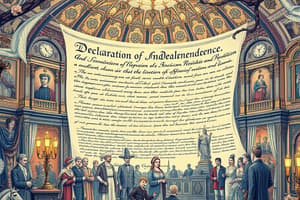Podcast
Questions and Answers
What was the main cause of the Revolutionary War?
What was the main cause of the Revolutionary War?
- Great Britain's attempt to assert more control over its North American colonies (correct)
- The American colonists' desire to remain under British rule
- The British government's support for American independence
- The desire of the American colonists for free tea
Which act passed by the British government imposed taxes on the American colonies without their consent, leading to widespread protests?
Which act passed by the British government imposed taxes on the American colonies without their consent, leading to widespread protests?
- Tea Act of 1773
- Sugar Act of 1764
- Quartering Act of 1765
- Stamp Act of 1765 (correct)
What event led to the Boston Tea Party and became a symbol of the American Revolution?
What event led to the Boston Tea Party and became a symbol of the American Revolution?
- The signing of the Declaration of Independence
- The Intolerable Acts
- The Tea Act of 1773 (correct)
- The Battle of Bunker Hill
Where did the Boston Tea Party take place?
Where did the Boston Tea Party take place?
Which battle is known for being one of the first major battles of the Revolutionary War?
Which battle is known for being one of the first major battles of the Revolutionary War?
What document formally announced the independence of the 13 North American colonies from Great Britain?
What document formally announced the independence of the 13 North American colonies from Great Britain?
What was the significance of the Declaration of Independence?
What was the significance of the Declaration of Independence?
Which battle marked a major victory for the British but at a heavy cost?
Which battle marked a major victory for the British but at a heavy cost?
When was the Treaty of Paris signed, effectively ending the Revolutionary War?
When was the Treaty of Paris signed, effectively ending the Revolutionary War?
What event highlighted growing tensions between the colonies and Britain over taxation and representation?
What event highlighted growing tensions between the colonies and Britain over taxation and representation?
Who led American and French forces in the successful trapping of the British army at Yorktown?
Who led American and French forces in the successful trapping of the British army at Yorktown?
What significant consequence did the Revolutionary War have on the United States?
What significant consequence did the Revolutionary War have on the United States?
Flashcards are hidden until you start studying
Study Notes
Revolutionary War: The Struggle for Independence
The Revolutionary War, also known as the American Revolution, lasted from 1775 to 1783. It marked the successful struggle of 13 North American colonies to gain political independence from Great Britain, eventually forming the United States of America. The war came about due to escalating tension between the British crown and American colonists, who sought greater autonomy and rejected efforts by the British government to exert more control over their affairs.
Causes of the Revolutionary War
The causes of the Revolutionary War can be traced back to the mid-18th century when Great Britain attempted to assert greater control over its North American colonies after years of 'salutary neglect' – a policy of limited intervention in colonial affairs. British actions included passing parliamentary acts for taxing the colonies without their consent, such as the Sugar Act of 1764, the Quartering Act of 1765, and the Stamp Act of 1765. These actions sparked widespread protests among colonists, leading to organized resistance and calls for greater representation in British government.
Key Events in the Revolutionary War
Boston Tea Party (December 16, 1773)
One of the most iconic events leading to the war was the Boston Tea Party, where American colonists, disguised as Native Americans, dumped tea into Boston Harbor to protest the Tea Act of 1773. The event highlighted growing tensions between the colonies and Britain over taxation and representation.
Battle of Bunker Hill (June 17, 1775)
The first major battle of the Revolutionary War occurred at Bunker Hill, with the British gaining the upper hand against the colonial militias. However, the victory came at a heavy cost, with the British suffering significant casualties.
Declaration of Independence (July 4, 1776)
The Declaration of Independence, adopted on July 4, 1776, formally declared the 13 North American colonies' intention to separate from British rule. The document outlined the colonists' grievances against the British monarchy and Parliament, and asserted the right of the people to create their own government based on their needs.
Battle of Yorktown (October 19, 1781)
A key turning point in the war was the Battle of Yorktown, where American and French forces, led by General George Washington and the Marquis de Lafayette, successfully trapped a British army under General Lord Cornwallis. The surrender of the British army at Yorktown effectively ended major military operations on the North American front, leading to peace negotiations.
Aftermath of the Revolutionary War
The Treaty of Paris was signed on September 3, 1783, officially ending the war. The United States had achieved their goal of independence, and the new nation began a period of establishing its identity and shaping its government. The Revolutionary War had significant long-term consequences, including the establishment of the United States as a leading world power and the spread of democratic ideals across the globe.
Studying That Suits You
Use AI to generate personalized quizzes and flashcards to suit your learning preferences.




